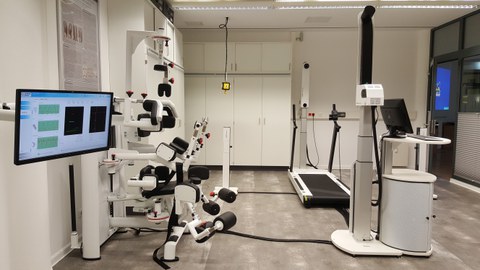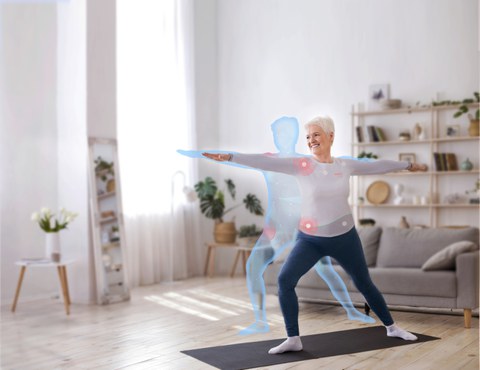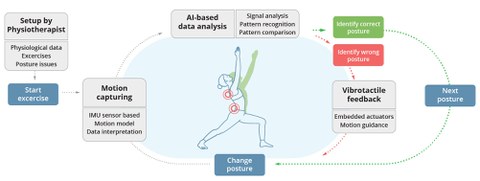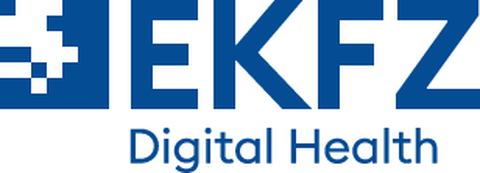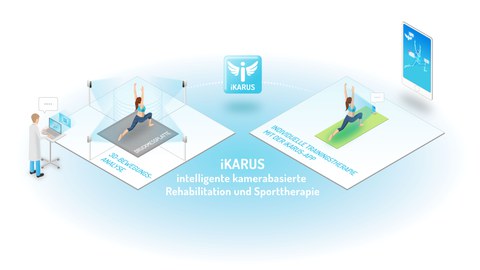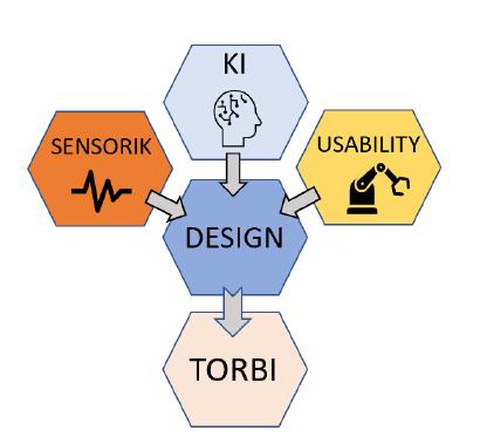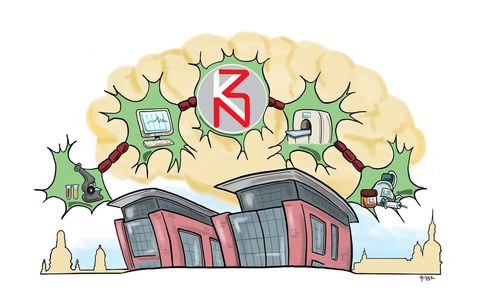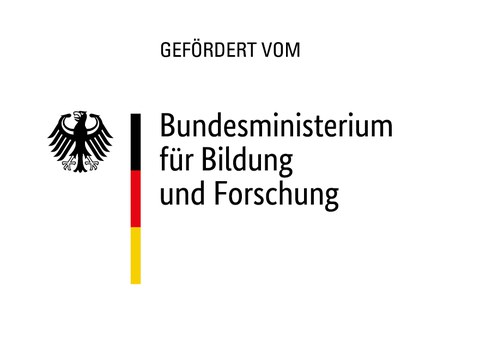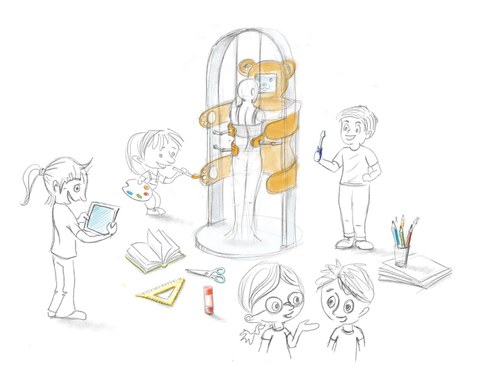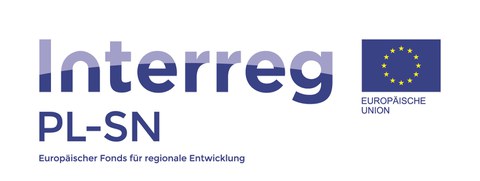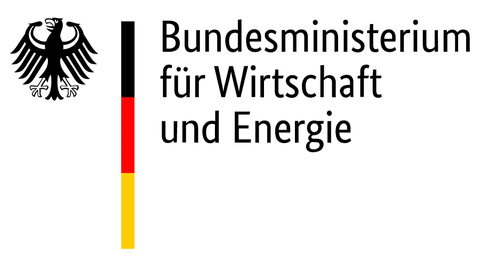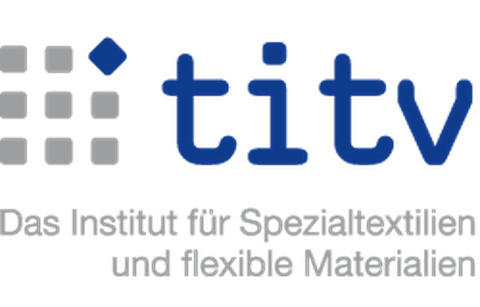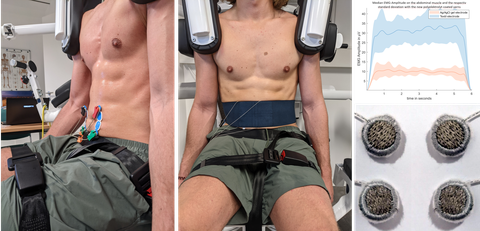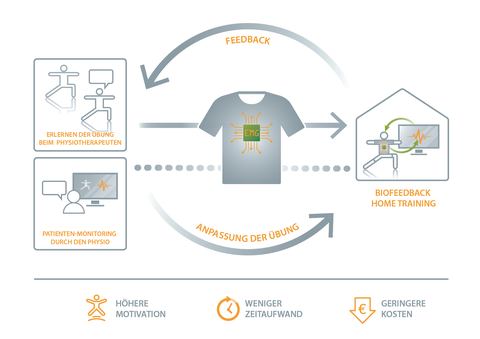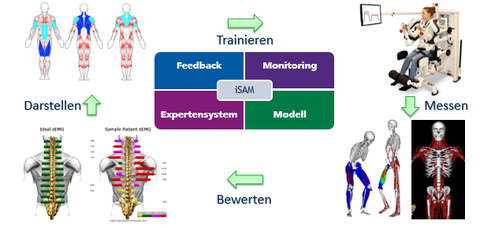Research Group Rehabilitation Technology
REHAdigital
Overview
The REHAdigital research group focusses on rehabilitation and orthopaedic technology. The main areas of research are
- Improving the diagnosis and treatment of postural deformities with the help of AI-assisted measurement technology.
- Development of a brace for adolescent scoliosis patients made of innovative material for increased wearing comfort.
- Development of wearable, intelligent sensors and feedback systems for therapy and virtual rehabilitation.
- New design of a robot-assisted therapy device for scoliosis treatment.
The following three videos on the topics of biosignalling, artificial intelligence (AI) and virtual reality (VR) provide an insight into our research work:
Biosignalling - where medicine and engineering meet (German)
Artificial Intelligence in biomedical rehabilitation technology (German)
Virtual Reality in biomedical engineering (German)
Collaboration
Interested persons have the opportunity to work on the research topics and current projects of the research group at any time within the scope of project work, student research projects, diploma and master's theses or through scientific/student assistant activities. Please address specific enquiries to Dipl.-Ing. Andreas Heinke .
Topics for student theses
Topics: Student research projects and theses - as PDF
Projects
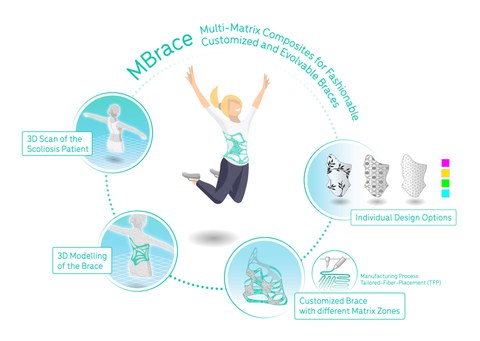
Project goal: Brace with increased comfort due to newly developed multi-matrix composites and dynamic adjustment
Brace treatment is part of the therapy for the spinal curvature scoliosis in adolescents. In addition to the physical discomfort resulting from the permanent constriction of the torso in a rigid plastic shell, many adolescents find the cosmetic impairment particularly distressing. The MBrace project aims to improve the well-being of young patients through an innovative brace design.
This measure is part of the M-ERA.NET project MBrace and is co-financed with tax funds on the basis of the budget approved by the Saxon state parliament with duration from 01.06.2022 - 31.05.2025. It gathers material scientists, engineers, constructors, designers and physicians from Belgium, Poland and Saxony in a consortium.
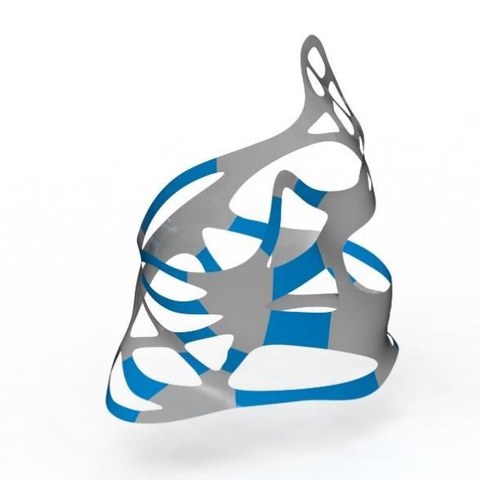
Concept study of a brace made of innovative composite materials
Research on new multi-matrix composites (MMC) is a key focus of the project. With the implementation of solid-state joints in multi-matrix composite construction in the brace, flexion of the torso is possible for the first time. The design of delicate support structures thanks to the newly developed materials and manufacturing processes enables better air circulation and reduces chafing. The use of lightweight materials leads to a significant reduction in the weight of the brace.
Newly developed dynamic methods for biomechanical evaluation of the orthosis make it possible to adapt the brace to the patient in motion. This reflects the everyday wearing of the brace much more realistically.
Depending on individual preference, the visibility of the brace can either be reduced or emphasised in a fashionable way. In this way, the brace has the potential to transform itself from a disruptive fixation device into a fashionable accessory. At the same time, compliance is significantly increased at an age when many young people take their physical appearance very much into account.
Further information on the project can be found at http://m-brace.eu/home/.
The trend towards keeping fit with the help of health apps has been greater than ever since the pandemic. According to Statista, 38% of Germans already use apps to exercise at home (2021). However, an app cannot offer the haptic guidance of a trainer or therapist on how to perform the exercise correctly. veiio aims to close this gap with smart clothing. Equipped with integrated sensors and actuators, it supports the user in performing physiotherapy exercises with the help of vibrotactile feedback.
The aim of the research project is to develop a digital physiotherapy assistant to market maturity. An expert system is being developed that assesses posture during exercises and provides feedback in real time. The result will be a proof-of-concept study with the veiio shirt using the example of back pain.
The veiio team consists of experts in the development of human-centred product-service systems, physiotherapy, electrical engineering and AI-supported data analysis. The spin-off is being established as part of the 6G-life research hub and the CeTI Cluster of Excellence. Prof Frank Fitzek (Head of the Deutsche Telekom Chair of Communication Networks and the above-mentioned clusters, TUD) and Prof Jens Krzywinski (Chair of Technical Design, TUD) are mentors of the project. There is also a cooperation with the WirbelsäulenCentrum of the Carl-Gustav-Carus University Hospital Dresden.
Funded by the Else Kröner Fresenius Centre for Digital Health (EKFZ)
Patients with joint problems are often prescribed rehabilitation sport. However, when carried out in group therapy, the individual cause of the pain cannot be taken into account. The desired pain relief is therefore usually limited. As a result, this leads to further visits to the doctor and follow-up prescriptions.
Adapting the exercises to the individual patient and increasing the frequency of training is not feasible, neither in terms of personnel nor financial expenditure. One solution is to assist patients with their training by using technical equipment. The project is developing an intelligent, multi-sensory system for analysing movement that acts as a virtual therapist.
In the first step, the patient works out selected exercises with their physiotherapist, which are recorded by multi-sensory technology. The movements are analysed and stored with the help of AI and signal processing. The intelligent model acts as a real-time feedback system that registers the progress of the therapy and adjusts the level of difficulty of the exercises accordingly. This enables patients to carry out their rehabilitation independently, regardless of location and with the necessary intensity.
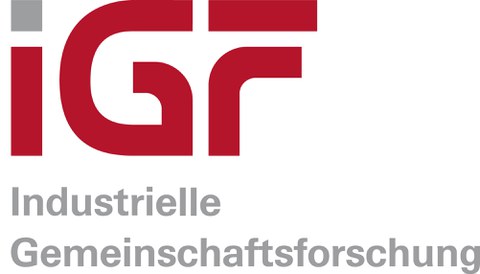
IGF Logo
The project is funded by the AiF as part of the Central Innovation Programme for SMEs (ZIM) of the BMWK with a term from 01.01.2023 - 31.12.2024.
Verletzungen am Kniegelenk zählen mit 13,6 % zu den häufigsten Unfallverletzungen in Deutschland. Bezogen auf die Gesamtbevölkerung bedeutet dies jährlich zwei Millionen behandlungsbedürftige Kniegelenke. Zur Routinediagnostik gehört das MRT, welches strukturelle Schäden erkennt. Ergänzend erfolgt eine funktionelle Analyse der Beweglichkeit und Kraft. Diese sind jedoch meist von Schmerzen überlagert und daher nur eingeschränkt zu beurteilen. Eine exakte Diagnostik ist jedoch unerlässlich, da selbst minimalinvasive Eingriffe zu einer Veränderung der Mechanik des Kniegelenks führen können, was das Risiko für Folgeverletzungen und nachträgliche Eingriffe deutlich erhöht.
Ziel des Forschungsvorhabens ist, mit der hochauflösenden Elektromyographie (HD-EMG) ein Werkzeug einzuführen, das dem Arzt eine muskuläre Funktionsdiagnose ermöglicht. Die EMG ermittelt den Erregungs- und Kontraktionszustand der Muskulatur unabhängig von der Bewegungsausführung. Die Applikation der Elektroden auf dem Gelenk ist jedoch zeitintensiv und erfordert Erfahrung. Hier liegt der Lösungsansatz in einer Elektrodenmanschette. Diese besteht aus einem Elektrodenarray eingebunden in eine elastische Polymermatrix, die sich an die komplexe Anatomie des Knies anpasst.
Das IBMT entwickelt die Elektronik für die Array-Elektrode. Biomechanische Modelle werden mit Algorithmen des maschinellen Lernens kombiniert und in die EMG-Manschette integriert. Anhand mathematischer Modelle werden komplexe Muskelsignale durch eine KI interpretiert.
Die Aufgabe des FILK erstreckt sich auf den Bereich der Werkstofftechnik. Dazu zählt die Entwicklung der Polymermatrix auf Silikonbasis sowie der Leiterbahnen auf Grundlage von nanopartikulären, leitfähigen Kohlenstoffkomponenten.
Damit entsteht innerhalb des Forschungsprojekts ein Prototyp, der perspektivisch auf weitere Gelenke wie Schulter und Hüfte übertragen werden kann.

Entwurf eines flexiblen Elektrodenarrays bestehend aus einer Silikonmatrix (blau), auf der Elektroden und Leiterbahnen (orange) appliziert sind.
Projektpartner: Forschungsinstitut für Leder und Kunststoffbahnen, FILK, gGmbH, Freiberg
Laufzeit: 01.03.2023 – 28.02.2025
Completed projects
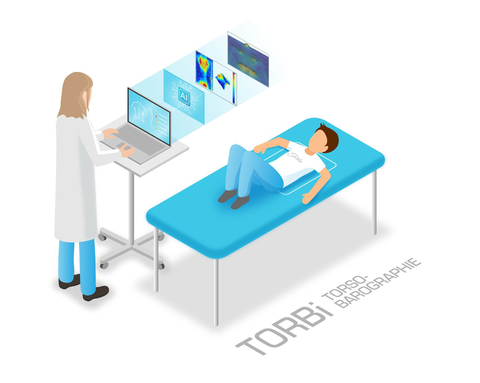
Screening method for the early detection of postural deformities
Early detection of postural abnormalities in adolescence and early therapeutic intervention prevent the development of structural postural deformity. An automated device-based screening method can act as an early detection system. The torsobarography concept developed in previous projects is being further developed into a commercially viable medical product in the TORBi project together with industrial partners.
The project is funded by the AiF as part of the Central Innovation Programme for SMEs (ZIM) of the BMWK and will be carried out from 01.04.2021 to 31.03.2023.
The concept of the measuring system is based on the transmission of morphological structures of the back in a lying position. Data is acquired using a capacitive sensor mat in accordance with a standardised measurement procedure known as torsobarography. The back profile is analysed for asymmetries using selected parameters. These can provide an indication of postural abnormalities as well as spinal disorders.
The data basis is formed by posture measurements on 1200 test subjects, who were examined by experts both in terms of equipment and clinically. This diagnostic capability is bundled and embedded in an efficient algorithm. The automatic evaluation enables operation by trained laypersons. This means that the diagnostic mat can be used in comprehensive screening programmes, e.g. in schools.
Um bei MS-Patienten die Verfestigung von Einschränkungen des Gehens zu verhindern, sollte eine Therapie möglichst frühzeitig beginnen. Voraussetzung dafür ist, dass auch subtile Veränderungen des Gangbildes erfasst werden.
Die vorliegende Studie hat zum Ziel, zu untersuchen, ob eine 15-minütige Ausdauerbelastung geeignet ist, beginnende Einschränkungen aufzuzeigen und damit zu einer verbesserten Frühdiagnostik beitragen kann. Dafür absolvieren sowohl gesunde Probanden als auch Patienten im MS-Zentrum der Universitätsklinik Dresden eine Ganganalyse. Darüber hinaus werden sie im Rehabilitationslabor des IBMT einer Analyse mit den DIERS-Systemen (Wirbelsäule, Beinachsen, Druckbelastung des Fußes) unterzogen.
Weiterführende Literatur:
Trentzsch, K.; Schumann, P.; Śliwiński, G. et al.: Using Machine Learning Algorithms for Identifying Gait Parameters Suitable to Evaluate Subtle Changes in Gait in People with Multiple Sclerosis. Brain Sci. 2021 Aug 7;11(8):1049. doi: 10.3390/brainsci11081049.
Schumann, P.; Scholz, M.; Trentzsch, K. et al.: Detection of Fall Risk in Multiple Sclerosis by Gait Analysis-An Innovative Approach Using Feature Selection Ensemble and Machine Learning Algorithms. Brain Sci. 2022 Oct 31;12(11):1477. doi: 10.3390/brainsci12111477.
Ein im Ausland erfolgreiches Gerät zur Skoliosetherapie auf den neuesten Stand der Technik zu bringen und zugleich nutzerfreundlicher zu konzipieren, war das Ziel des Projekts KATi. Das Besondere: Die jungen Patienten sollten von Beginn an in den Designprozess einbezogen werden. Schließlich sind sie es, die Tag für Tag mit diesem Gerät umgehen.
Im allgemeinen werden Jugendliche in der Medizinprodukteentwicklung fast vollständig übergangen mit der Folge, dass sie mit Geräten umgehen müssen, die entweder für Kinder oder für Erwachsene konzipiert wurden. Aus diesem Grund wurde vom BMBF ein Förderprogramm aufgelegt, in dessen Rahmen das KATi-Projekt von 05/2019 bis 10/2021 finanziert wurde.
125.000 Heranwachsende sind in Deutschland von einer behandlungsbedürftigen Form der adoleszenten Skoliose betroffen. Die gerätegestützte FED-Therapie zeigt im Ausland gute Erfolge, ist aber in Deutschland so gut wie unbekannt. Die Weiterentwicklung des Geräts zu einem Therapieroboter war das Ziel des Konsortiums bestehend aus den Forschungseinrichtungen IBMT der TU Dresden und dem Institut für Physiotherapie (IfPT) der Universität Jena sowie den Industriepartnern DIERS International GmbH und EvoSense Research & Development GmbH.
Aufgabe des IBMT war, des Roboter um ein Haltungsmonitoring zu erweitern, das Patient und Therapeut Feedback gibt. In eine Spielumgebung eingebettet, trägt es zur aktiven Mitarbeit des Patienten bei. Ein kamerabasiertes Messsystem detektiert nun die Wirbelsäulenhaltung während der Therapie und bewertet sie mithilfe von Machine Learning in Echtzeit.
Die Sportwissenschaftler der Universität Jena entwickelten ein altersübergreifend wirksames Therapiekonzept rund um die robotergestützte Behandlung, das sich ökonomisch sinnvoll in den Praxisalltag implementieren lässt.
Ein besonderes Anliegen der jungen Patienten war die Vermeidung einer plötzlichen Ohnmacht (Synkope). Zu ihr kommt es häufig aufgrund der körperlichen und mentalen Belastung im Gerät. Im Projekt ist ein Aufklärungsvideo entstanden, das die Patienten ermächtigt, über die Erkennung von Frühzeichen Gegenmaßnahmen zu ergreifen.
Das Herzstück des Projekts bildeten jedoch Workshops mit jungen Skoliosepatienten. In drei dreitägigen Workshops arbeiteten Ingenieure und Designer mit den Patienten zusammen, um deren Wünsche und Bedürfnisse in realisierbare Konzepte zu überführen. Aus diesen Erfahrungen ist ein Handbuch https://www.tib.eu/de/suchen/id/TIBKAT:1853138096 entstanden als Anregung für alle, die künftig jugendlichen Patienten in ihre Medizinprodukteentwicklung einbeziehen wollen.
Weiterführende Informationen:
https://healthcare-in-europe.com/de/news/forschung-intelligente-therapie-geraete-fuer-skoliosebehandlung.html
Publikationen:
Nisser, J.; Smolenski, U.C.; Śliwiński, G.E. et al.: Skoliosespezifische Physiotherapie bei Patienten mit idiopathischer Adoleszentenskoliose (AIS) – ein narratives Review. Physikalische Medizin, Rehabilitationsmedizin, Kurortmedizin 2018; 28(02): 88-102. © Georg Thieme Verlag KG Stuttgart · New York DOI: 10.1055/s-0043-124472
Schumann, P.; Heinke, A.; Jochim, T.; Lieberknecht, T.; Nisser, J.; Derlien, S.; Śliwiński, Z.; Malberg, H.; Śliwiński, G.: Artificial Intelligence To Evaluate The Short-term Progress Of Device Assisted Scoliosis Therapy On The Example Of FED Method. Delta University Scientific Journal. Article 4, Volume 3, Issue 2, September 2020, Page 33-45. DOI: 10.21608/dusj.2020.205877
Werner, M.; Rietze, J.; Ullrich, M.; Sliwinski, G. et al: Entwicklung eines modernen, kindgerechten FED-Therapiegerätes. Conference Paper. 5. Dresdner Medizintechnik Symposium 2014. Dresdner Medizintechnik Symposium 2014.
Ca. 80 % der Schulkinder in Deutschland weisen Anzeichen einer Haltungsschwäche auf. 125.000 Heranwachsende sind von der Wirbelsäulenverkrümmung Skoliose betroffen. Eine frühzeitige Diagnose und Intervention tragen dazu bei, Beschwerden, die meist erst im Erwachsenenalter auftreten, zu verhindern. Allen voran das Volksleiden Nr. 1 – Rückenschmerzen.
Bei der Frühdetektion anzusetzen, war das Ziel des Projekts Gesunde Kinder – Gesundes Europa. Große Wissenschaft für kleine Patienten – WiP. Es wurde ein Screeningverfahren entwickelt, das haltungsgesunde von haltungsauffälligen Kindern unterscheidet.
Das Projekt wurde von der Europäischen Union im Rahmen des INTERREG-Programms Polen-Sachsen 2014-2020 gefördert.
Laufzeit: März 2017 - Februar 2020
Projektpartner: Rehabilitationsklinik SPZOZ Zgorzelec, Polen
1200 Kinder im Alter zwischen 7 und 13 Jahren wurden innerhalb dieses und seines Vorgängerprojekts (2011-14) auf ihre Haltungsgesundheit untersucht.
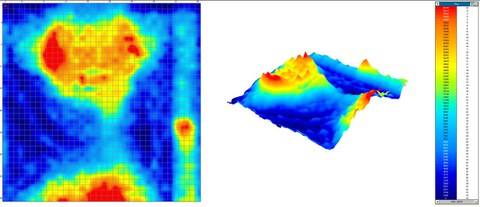
Rohdaten einer Torsobarographie in 3D-Ansicht
Mit der Torsobarographie ist ein innovatives Messverfahren einer computergestützten Analyse der Körperhaltung entstanden. Die Probanden wurden gerätetechnisch und manuell untersucht. Zur Entwicklung des neuen Screeningverfahrens wurde eine Druckmessmatte verwendet, die einen Abdruck des Rückenprofils generiert. Algorithmen werten dieses Druckbild hinsichtlich Asymmetrien aus.
Als Ergebnis ist ein Datensatz der Körperhaltungsparameter bestehend aus gerätetechnischen und manuellen Untersuchungen sowie den Referenzdaten der Torsobarographie entstanden. Dieser wird seitdem vielfach verwendet – in Diplomarbeiten und Dissertationen, aber auch in den Projekten MBrace und KATi.
Das Konzept der Torsobarographie wird im Projekt TORBi – die intelligente Diagnosematte in Kooperation mit Industriepartnern zu einem Medizinprodukt weiterentwickelt. Im Ergebnis soll ein einfach zu bedienendes Gerät entstehen, das von geschulten Laien eingesetzt werden kann, z.B. von Sportlehrern an Schulen. Auf diese Weise könnten jährliche Reihenuntersuchungen organisiert werden.
Das übergeordnete Ziel des Projekts bestand jedoch darin, einen vereinheitlichten Zugang zur medizinischen Versorgung in der Europastadt Görlitz/Zgorzelec anzustoßen, um die Ressourcen der Grenzregion effizienter zu nutzen. Der Patientenmobilitätsrichtlinie 2011/24/EU entsprechend, sollten am Beispiel der Untersuchungen der Körperhaltung, die polnischen und deutschen Kindern gleichermaßen offenstand, Synergien aufgezeigt werden. Unterschiedliche Rechtsvorschriften und Abrechnungsmodalitäten verhindern jedoch bislang die praktische Umsetzung. Ein Rechtswissenschaftler erarbeitete im Projekt Möglichkeiten zur Harmonisierung der Rechtsvorschriften. Die Ergebnisse sind hier abrufbar.
Weitere Informationen: Projektbericht
Publikationen:
Koch, S.; Arnold, S.; Zeckay, R.; Sliwinski, G. et al.: Analysis of the distribution of pressure patterns in children with postural deformities. Biomed Tech 2012; 57 (Suppl. 1) © 2012 by Walter de Gruyter · Berlin · Boston. DOI: 10.1515/bmt-2012-4462
Zeckay, R.; Sliwinski, G. et al.: Identification of relevant clinical symptoms for the development of a machine-aided screening method of postural deformities. Biomed Tech 2013; 58 (Suppl. 1) © 2013 by Walter de Gruyter · Berlin · Boston. DOI 10.1515/bmt-2013-4389
Skoliose ist eine Seitverkrümmung der Wirbelsäule, die während der Wachstumsphase therapiert werden muss, um Spätschäden im Erwachsenenalter zu verhindern. Die in Deutschland angewandte Physiotherapie nach der Schroth-Methode ist kognitiv anspruchsvoll und zudem personalintensiv und kostspielig.
In Spanien und Polen zeigt die gerätegestützte FED-Therapie gute Erfolge, den jugendlichen Patienten eine physiologische Körperhaltung zu vermitteln. Diese wird vom Gerät vorgegeben und soll phasenweise vom Patienten aus eigener Kraft aufrechterhalten werden. Die verwendeten FED-Geräte weisen jedoch erhebliches Modernisierungspotential auf.
Ziel der Projektpartner IBMT und Fraunhofer IWU war, die FED-Methode in ein Gerät zu überführen, das heutigen Anforderungen gerecht wird. Im Fokus stand die Verbesserung der Bedienerführung und die Reproduzierbarkeit der Therapie. Besonderen Wert wurde auf eine offene Bauweise des Roboters gelegt, die den Patienten nicht einengt. Die Implementierung eines Feedbacksystems mittels EMG-Signalen ermöglicht den jungen Patienten erstmals, die Qualität ihrer Mitarbeit nachzuvollziehen. Die Gamification der Übungen wirkt sich darüber hinaus motivationssteigernd aus.
Entstanden ist ein Therapieroboter mit dem Potential, sich auf dem deutschen und internationalen Markt zu etablieren.
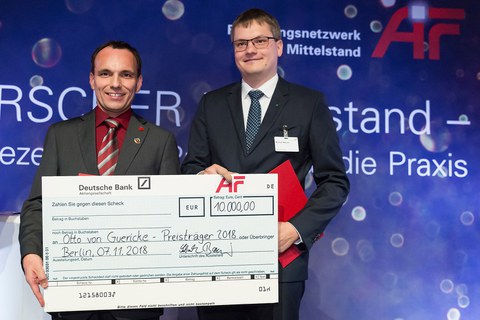
Preisverleihung: Dr.-Ing. Grzegorz Śliwiński (links), Dipl.-Ing. Michael Werner (rechts)
Für ihre Forschungsarbeiten wurde Dr.-Ing. Grzegorz Śliwiński zusammen mit Dipl.-Ing. Michael Werner vom Fraunhofer IWU mit dem Otto von Guericke-Preis 2018 der AiF ausgezeichnet.
Link: Video zum KiTS-Projekt
Förderung: BMWi-Programm: Industrielle Gemeinschaftsforschung (IGF)
Laufzeit: KiTS 2.0: 01.10.2016 – 30.09.2018
Weiterführende Literatur:
Nisser, J.; Smolenski, U.; Sliwinski, G.E.; Schumann, P.; Heinke, A.; Malberg, H. et al.: The FED-Method (Fixation, Elongation, Derotation)a Machine-supported Treatment Approach to Patients with Idiopathic Scoliosis– Systematic Review Die FED-Methode (Fixation, Elongation, Derotation)ein gerätegestütztes Behandlungsverfahren zur Behandlung von Patienten mit idiopathischer Skoliose– systematisches Review. Z Orthop Unfall 2020; 158: 318–332. Georg Thieme Verlag KG Stuttgart, New York. DOI https://doi.org/10.1055/a-0881-3430 Published online 12.08.2019
Schumann, P.; Heinke, A.; Jochim, T.; Lieberknecht, T.; Nisser, J.; Derlien, S.; Śliwiński, Z.; Malberg, H.; Śliwiński, G.: Artificial Intelligence To Evaluate The Short-term Progress Of Device Assisted Scoliosis Therapy On The Example Of FED Method. Delta University Scientific Journal. Article 4, Volume 3, Issue 2, September 2020, Page 33-45. DOI: 10.21608/dusj.2020.205877
Śliwiński et al.: Universal brace simulation platform. Scoliosis 2014 9(Suppl 1):O55. doi:10.1186/1748-7161-9-S1-O55
Anzahl und Dauer physiotherapeutischer Anwendungen reichen nicht aus, um dauerhafte Ergebnisse zu erzielen.
Ziel des Projekts iTEX ist ein in Textil integriertes Monitoringsystem für die häusliche Anwendung zur Unterstützung von Patienten und Therapeuten bei der Bewertung der Übungsqualität.
Das Projekt wird gefördert vom BMWi im Rahmen des Programms Industrielle Gemeinschaftsforschung (IGF)
Laufzeit: 01.2020 – 12.2022
Projektpartner: Textilforschungsinstitut Thüringen Vogtland e.V. (titv), Greiz
Erforscht wird ein Verfahren, wie sich Trockenelektroden zur Ableitung von EMG-Signalen dauerhaft in Textilgarn integrieren lassen. Es entstehen textiltechnologisch gefertigte Elektroden. Diese sind waschbar, atmungsaktiv und weisen nur einen geringen Übergangswiderstand auf. Es entsteht eine textiltechnologisch gefertigte Elektrode. Als Array integriert, entfällt die exakte Positionierung auf dem Muskel. Intelligente Algorithmen suchen sich aus einer Elektrodenmatrix das optimale Signal.
Die einfache Handhabung ermöglicht den Einsatz als vielseitiges Medizin- und Sportprodukt für alle, die ihre Physiotherapie flexibel in den Alltag integrieren wollen. Das telemedizinisches Behandlungskonzept gibt dem Patienten die notwendige Unterstützung und dem Therapeuten die Einsicht in Quantität und Qualität der Übungsausführung.
Weitere Informationen:
https://dechema.de/Forschung/AiF/Forschungsprojekte/Laufende+Projekte/21117+BR.html
Die Modernisierung des FED-Geräts zur Skoliosetherapie zählt zu den Hauptanliegen der AG REHAdigital. Das im Rahmen des ZIM-Netzwerks pro-O-light Innovationen der Medizintechnik geförderte Projekt FEDi (Laufzeit 10/2018 – 09/2020) widmete sich der Entwicklung von Bionik-Hand-Aktoren.
Grundprinzip der FED-Therapie ist die mechanische Korrektur der Wirbelsäulenkrümmung durch Druckausübung und -entlastung im Brust- und Lendenbereich. Sowohl die druckausübenden Kompressionsarme als auch die Fixationsarme des bestehenden FED-Gerätes lassen sich nur in sehr begrenztem Umfang an den jeweiligen Patiententhorax anpassen. Im Projekt FEDi sollten Aktoren entwickelt werden, die sich, einer Therapeutenhand nachempfunden, präziser auf die patientenindividuellen Strukturen einstellen können. Die Lösung fand sich in nach dem Fischflossen-Effekt konstruierten Aktoren, die im 3D-Druck aus silikonbasiertem Material gefertigt werden. Dies ermöglicht erstmals eine optimale Krafteinleitung durch homogene Druckausübung. Zudem wird die Weichheit und Elastizität sowie die Beweglichkeit einer menschlichen Hand imitiert.
Das zweite Ziel des FEDi-Projekts bestand darin, das bisher rein nach medizinisch-technischen Anforderungen konzipierte Gerät mit einen zeitgemäßen Design auszustatten. In Zusammenarbeit mit Industriedesignern wurde die käfigartige Struktur aufgebrochen und durch ein offenes Gestaltungskonzept ersetzt. Erstmals gibt eine Geräteverkleidung dem FED ein patientenfreundlicheres Äußeres. Auch die neugestalteten Aktoren tragen dazu bei, die hohe psychische Belastung der jungen Patienten zu verringern. Im Ergebnis ist ein Gerät entstanden, mit dem die Skoliosetherapie bei Jugendlichen entscheidend verbessert werden kann.
Die Diagnose und Therapie von muskulären Funktionsstörungen gehört zum Alltag der orthopädischen Rehabilitation. Die isometrische Kraftmessung ist das beste nichtinvasive Werkzeug für die objektive Diagnose von Muskelerkrankungen. Computergestützte Test- und Trainingssysteme für die Messung isokinetischer oder isometrischer Muskelkraft sind weit verbreitet, ihr Diagnosepotential jedoch bei weitem nicht ausgeschöpft.
Fortschritte auf dem Gebiet der Elektromyographie (EMG), insbesondere des Oberflächen-EMG haben den Weg für innovative Anwendungsmöglichkeiten geebnet. Hier setzt das iSAM-Kooperationsprojekt an. Die Datenfusion mechanischer, elektrischer und optischer Messsysteme zu einem patientenindividuellen Muskelmodell ermöglicht die differenzierte isometrische Kraftmessung eines einzelnen Muskels.
Für den Therapeuten wird es damit möglich, einzelne defizitäre oder überlastete Muskeln zu identifizieren. Die Therapie kann entsprechend fokussiert und die Rehabilitation intensiviert werden.
Das Projekt wurde vom BMWI im Rahmen des ZIM-Programms gefördert.
Laufzeit: 01.01.2016 - 31.12.2017
Partners
The intensive co-operation with partners from universities, industry and clinical practice in Germany and abroad enables a range of activities from basic basic research to integrative design and the development of prototypes through to large-scale clinical studies.
Among the university partners, there are close contacts with the Dresden University of Applied Science HTW, the Therapeutic Sciences Department at Brandenburg University of Technology Cottbus-Senftenberg and members of the University Cancer Centre Leipzig (UCCL). Collaboration with physiotherapists from the Collegium Medicum at the Jan Kochanowski University in Kielce has been continuously expanded over several projects. There is also intensive collaboration with the Leibniz Institute of Polymer Research Dresden (ipf).
At the TU Dresden, projects have already been realised together with the Multiple Sclerosis Centre Dresden (MSZ) at the Carl Gustav Carus University Hospital.
The Belgian research funding agency Sirris and the manufacturer of mineral fibres ISOMATEX S.A. are part of the MBrace project.
Among the industrial partners, the collaboration with the company DIERS International GmbH, which develops, manufactures and distributes biomechanical measuring systems, is particularly noteworthy. The working group uses devices from the DIERS product portfolio for its research as well as the company's expertise in the development of device concepts. DIERS is also a regular host of internships for students.
Contact and further information
 © IBMT
© IBMT
Research Group Leader
NameMr Dipl.-Ing. Andreas Heinke
Rehabilitation Technology Group
Send encrypted email via the SecureMail portal (for TUD external users only).
Visitor Address:
Fetscherforum (F29), 1st Floor, Room 07 Fetscherstr. 29
01307 Dresden
None


